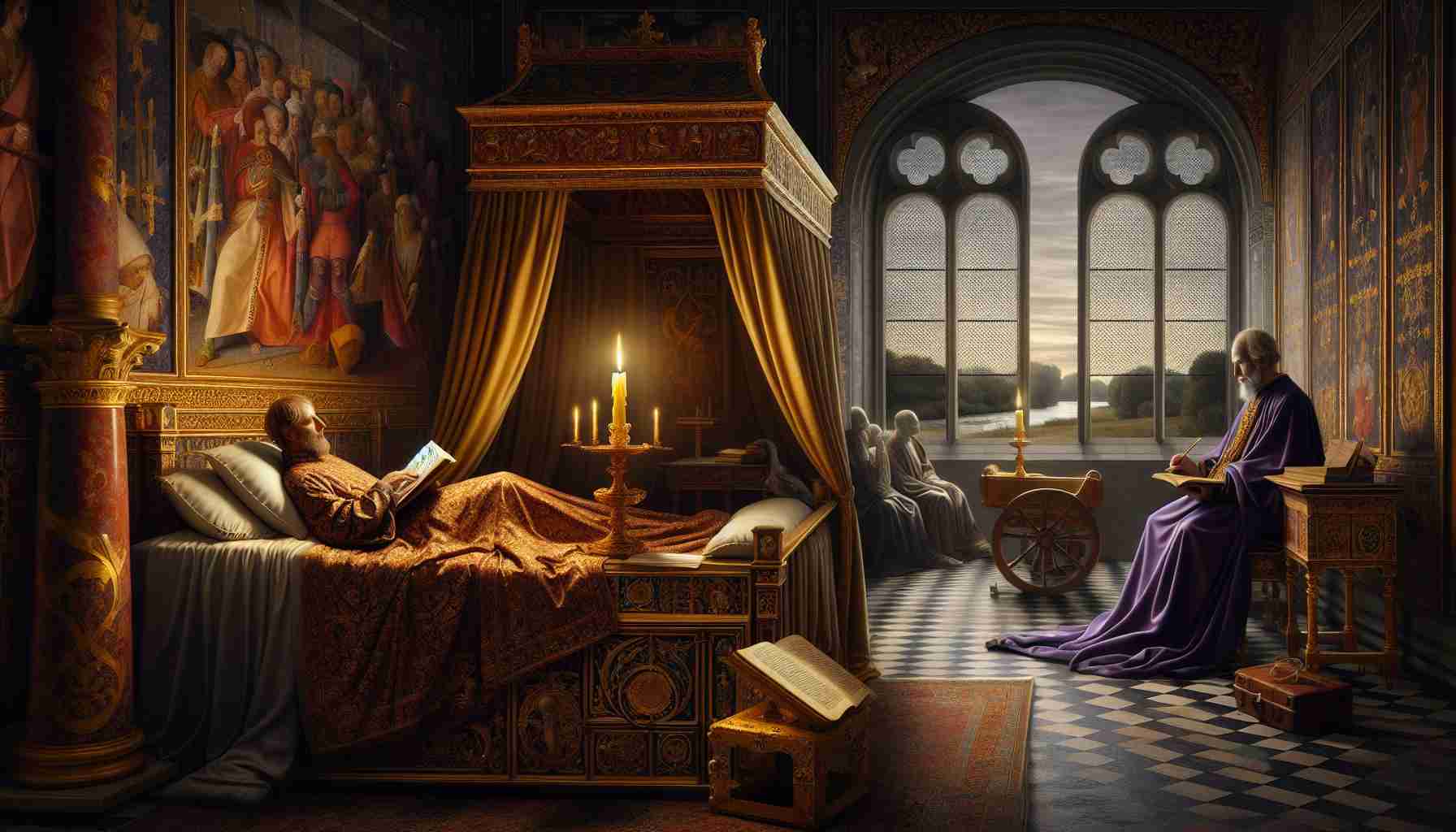

The Rhine flowed steady and gray beneath a low June sky, its current pressing onward as if obeying no king nor council, only the seasons and the breath of God. In the imperial villa at Ingelheim, a candle guttered in the chamber where once Charlemagne himself had held court. There, among the draped standards and worn Gospel tomes, Louis the Pious lay quiet. The emperor’s final breath passed unnoticed by the wind outside.
Silence rose like incense.
The abbots and bishops gathered near the bed did not weep. Men of God, they folded their hands in solemn prayer, though many knew what would follow his passing. Unity once held by tapestry threads and Scripture might now fray. For even a righteous king leaves behind ambition-hungry sons.
Louis had ruled not with an iron hand but with a penitent heart. Crowned co-emperor by his father in 813, he inherited not only the mantle of Charlemagne but also the weight of a kingdom baptized in fire and fear. The Frankish lords had admired Charlemagne’s conquests—his sword bore Christ’s sign and the blood of Saxons. But Louis, the monk-king, turned inward, repairing the soul of the empire with prayer, fasting, and reform. Some mocked his piety as meekness; others called it divine conviction.
He had once wept publicly in a Benedictine habit, confessing before nobles and bishops that he had failed to prevent his sons' rebellion. That day, angels did not descend, but something steadier took root: the people began to see that repentance, even in kings, was woven into God’s mercy.
Now he was gone.
Bishop Hilduin, a graying figure in violet vestments, stepped beside the bier and placed a psalter on Louis’s chest. A psalm had been on the emperor’s lips not long before—he had murmured it again and again: Put not your trust in princes, nor in a son of man, in whom there is no salvation (Psalm 146:3). Perhaps he meant it for his sons. Or for himself.
In the hills beyond the villa, word reached Lothair by torchlight. The eldest son, clever but proud, unfurled the message with fingers scarred from war. His father was dead. And though he had once pledged fealty beneath cathedral arches, greed now stirred within. Imperial unity was no shepherd’s crook; it was crown and coin. And Louis’s empire, like Jerusalem before its fall, would divide.
Monks in Tours rang the bells that evening with measured grief. In Corbie and Saint-Denis, scribes dipped quills into ink and recorded his passing in the Annales Regni Francorum. Some called him saintly; others, weak. Yet the monasteries he funded still stood—arks of learning amid a flood of war. Under his rule, schools for the laity had multiplied, the Rule of St. Benedict enforced more earnestly, and church councils restored to dignity through his urging.
Even in his failures, Louis had bid men look to God.
A soldier-turned-hermit named Everic knelt by the stone chapel near Frankfurt the next morning, the story having already reached his ears. Years earlier, Louis had pardoned his desertion, commanding him to serve the kingdom in silent prayer rather than the sword. “Better to guard a soul,” Louis had said, “than a fortress crumbling from pride.” Everic now wept—not for a sovereign, but for a man who had washed even the feet of beggars during Lent.
Three hundred leagues south, in Rome, Pope Gregory IV received a sealed scroll etched in Latin. He read it beneath candlelight in the Lateran Palace, his brows furrowed. He had once prayed side by side with Louis as rebellion birthed civil war, and though the Holy Father held no armies, he had written letters weighted with wisdom.
"The emperor was flawed," Gregory whispered, "but he feared the Lord." That had been his strength.
The empire would soon split in three, torn among Louis’s quarrelsome heirs during the Treaty of Verdun, with blood and parchment shaped by ambition. Ravenna’s mosaics would reflect not peace but the mirrored pride of brothers at odds. And bishops would be pressed to choose sides, their ecclesiastical robes muddied with loyalties unsought.
Yet in the cloisters that summer, younger monks spoke of the emperor with reverence. They did not recall the wars but the sermons, the hunger Louis had for righteousness, not glory. And in Lyon, a monk named Adelhard copied the Psalms by lamplight. Upon reaching the verses Louis had loved, the young monk paused to inscribe an extra line in the margin.
"When his breath departs, he returns to the earth; on that very day his plans perish. But blessed is he whose help is the God of Jacob."
Louis’s plan had perished at Ingelheim—but not his hope.
God alone held dominion untouched by death.
So the Rhine flowed, bearing the emperor’s spirit beyond cathedrals and crowns, past the marble tombs and councils yet to come, into the invisible country ruled by the Sovereign unseen.
And the bells of Aachen rang one last time—not for the passing of a prince, but for a servant returned home.